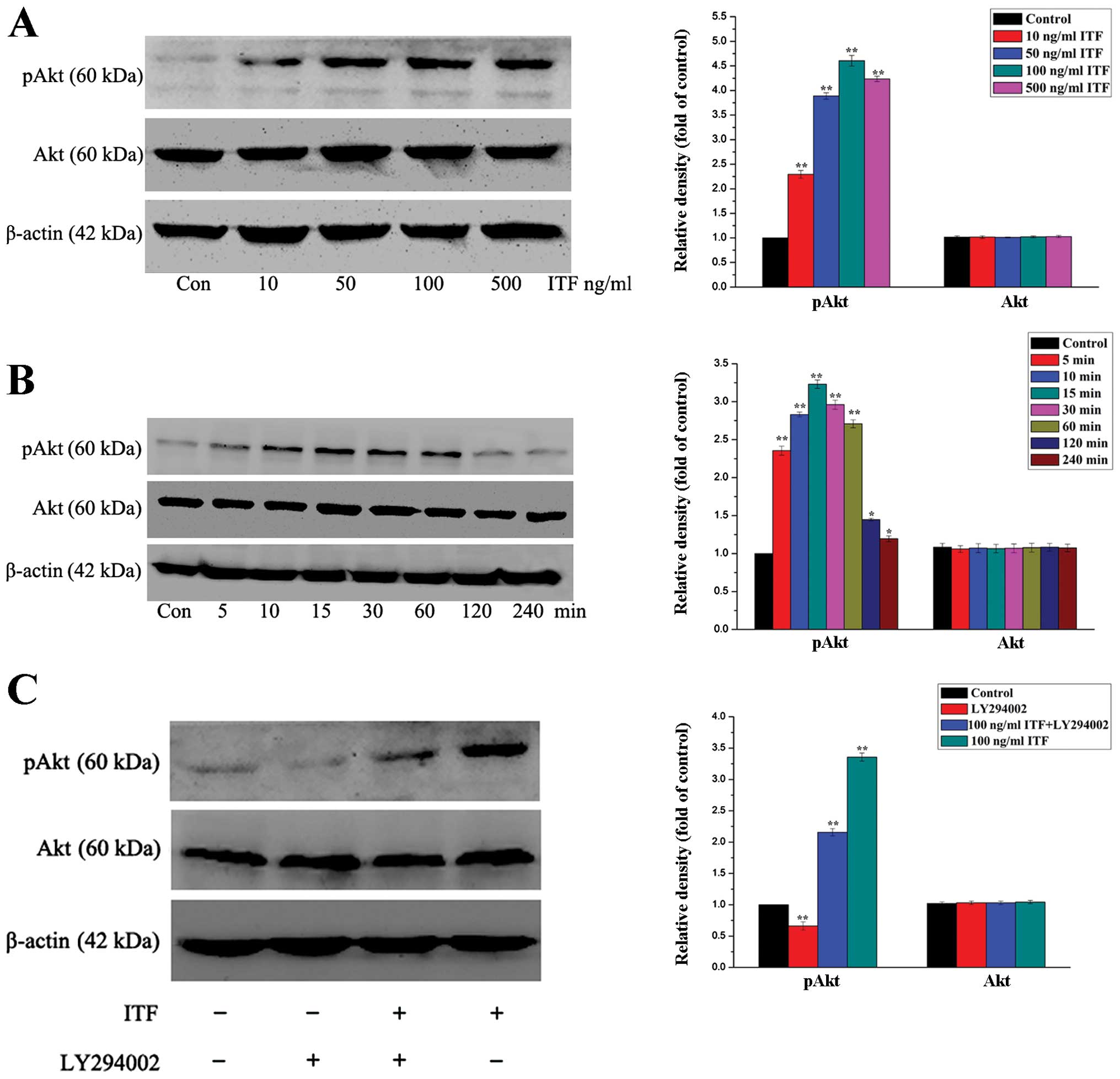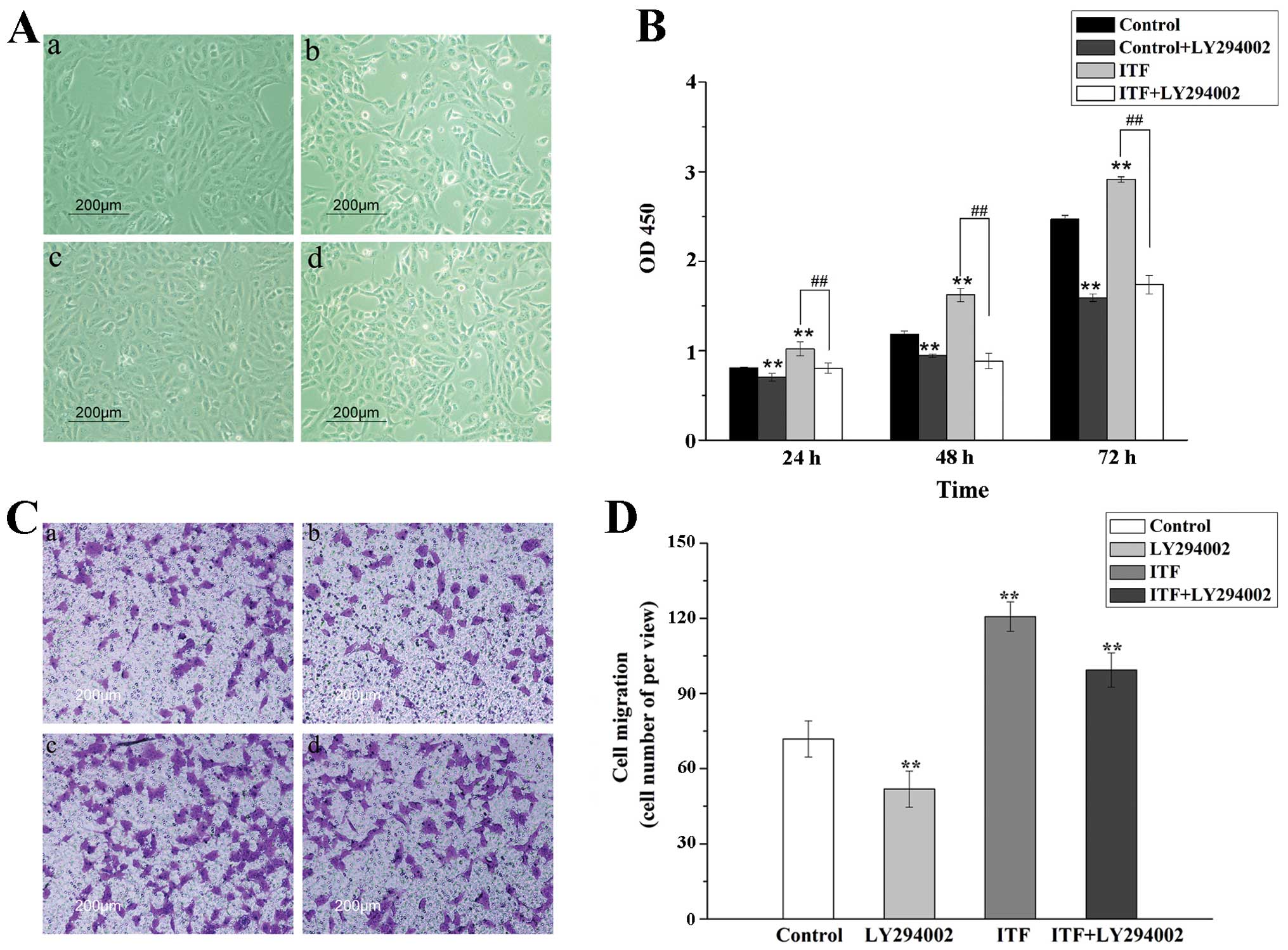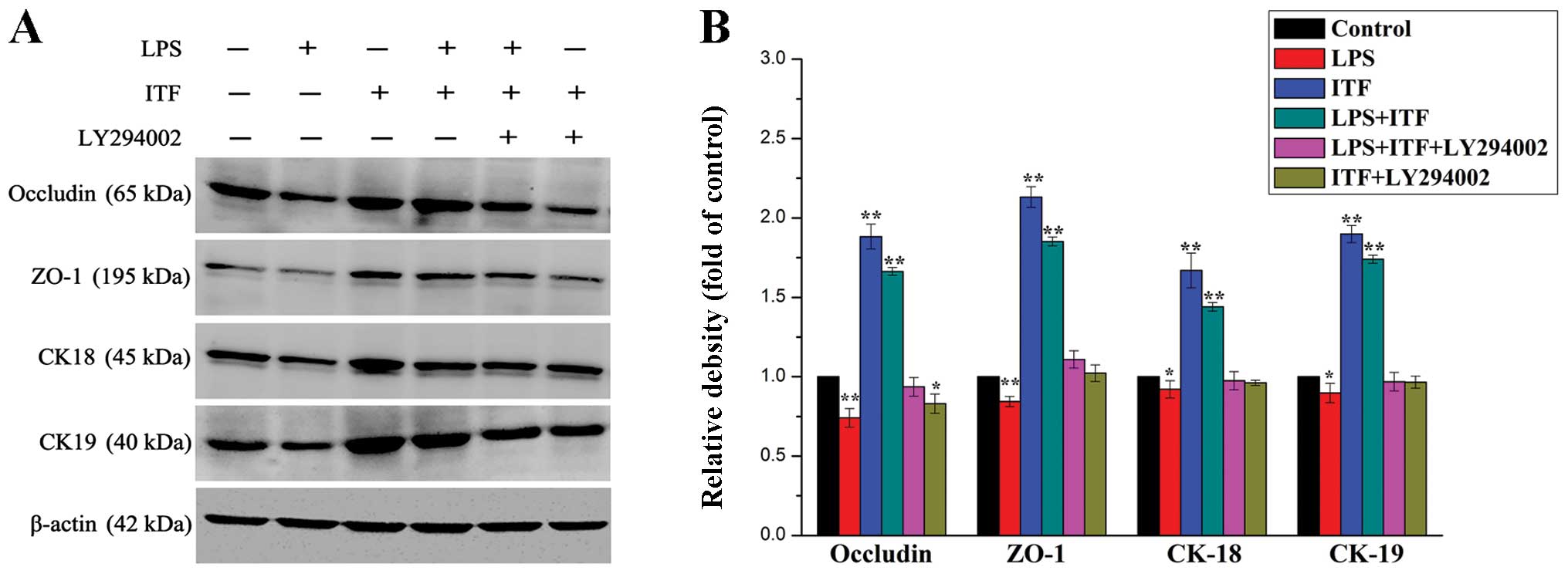|
1
|
Podolsky DK: Mucosal immunity and
inflammation. V Innate mechanisms of mucosal defense and repair:
the best offense is a good defense. Am J Physiol. 277:G495–G499.
1999.PubMed/NCBI
|
|
2
|
Wright NA: Aspects of the biology of
regeneration and repair in the human gastrointestinal tract. Philos
Trans R Soc Lond B Biol Sci. 353:925–933. 1998. View Article : Google Scholar : PubMed/NCBI
|
|
3
|
Podolsky DK: Healing the epithelium:
solving the problem from two sides. J Gastroenterol. 32:122–126.
1997. View Article : Google Scholar : PubMed/NCBI
|
|
4
|
Santos MF, McCormack SA, Guo Z, et al: Rho
proteins play a critical role in cell migration during the early
phase of mucosal restitution. J Clin Invest. 100:216–225. 1997.
View Article : Google Scholar : PubMed/NCBI
|
|
5
|
Dieckgraefe BK, Santoro SA and Alpers DH:
Immunolocalization of alpha-integrin subunits and extracellular
matrix components during human colonic organogenesis.
Gastroenterology. 110:58–71. 1996. View Article : Google Scholar
|
|
6
|
Wright NA, Hoffmann W, Otto WR, Rio MC and
Thim L: Rolling in the clover: trefoil factor family (TFF)-domain
peptides, cell migration and cancer. FEBS Lett. 408:121–123. 1997.
View Article : Google Scholar
|
|
7
|
Taupin D and Podolsky DK: Trefoil factors:
initiators of mucosal healing. Nat Rev Mol Cell Biol. 4:721–732.
2003. View
Article : Google Scholar : PubMed/NCBI
|
|
8
|
Dignass A, Lynch-Devaney K, Kindon H, Thim
L and Podolsky DK: Trefoil peptides promote epithelial migration
through a transforming growth factor beta-independent pathway. J
Clin Invest. 94:376–383. 1994. View Article : Google Scholar : PubMed/NCBI
|
|
9
|
Potten CS, Merritt A, Hickman J, Hall P
and Faranda A: Characterization of radiation-induced apoptosis in
the small intestine and its biological implications. Int J Radiat
Biol. 65:71–78. 1994. View Article : Google Scholar : PubMed/NCBI
|
|
10
|
Babyatsky MW, deBeaumont M, Thim L and
Podolsky DK: Oral trefoil peptides protect against ethanol- and
indomethacin-induced gastric injury in rats. Gastroenterology.
110:489–497. 1996. View Article : Google Scholar : PubMed/NCBI
|
|
11
|
Sun Y, Zhu Y, Wang L, Mao X, Peng X and
Peng Y: Recombinant adenovirus-mediated intestinal trefoil factor
gene therapy for burn-induced intestinal mucosal injury. PLoS One.
8:e624292013. View Article : Google Scholar : PubMed/NCBI
|
|
12
|
Cantley LC: The phosphoinositide 3-kinase
pathway. Science. 296:1655–1657. 2002. View Article : Google Scholar : PubMed/NCBI
|
|
13
|
Li Q and Zhu GD: Targeting
serine/threonine protein kinase B/Akt and cell-cycle checkpoint
kinases for treating cancer. Curr Top Med Chem. 2:939–971. 2002.
View Article : Google Scholar : PubMed/NCBI
|
|
14
|
Bao S, Wang Y, Sweeney P, et al:
Keratinocyte growth factor induces Akt kinase activity and inhibits
Fas-mediated apoptosis in A549 lung epithelial cells. Am J Physiol
Lung Cell Mol Physiol. 288:L36–L42. 2005. View Article : Google Scholar : PubMed/NCBI
|
|
15
|
Baus-Loncar M and Giraud AS: Multiple
regulatory pathways for trefoil factor (TFF) genes. Cell Mol Life
Sci. 62:2921–2931. 2005.PubMed/NCBI
|
|
16
|
Sun Z, Wang Y, Gong X, Su H and Han X:
Secretion of rat tracheal epithelial cells induces mesenchymal stem
cells to differentiate into epithelial cells. Cell Biol Int.
36:169–175. 2012. View Article : Google Scholar : PubMed/NCBI
|
|
17
|
Storesund T, Hayashi K, Kolltveit KM,
Bryne M and Schenck K: Salivary trefoil factor 3 enhances migration
of oral keratinocytes. Eur J Oral Sci. 116:135–140. 2008.
View Article : Google Scholar : PubMed/NCBI
|
|
18
|
Yee DS, Tang Y, Li X, et al: The Wnt
inhibitory factor 1 restoration in prostate cancer cells was
associated with reduced tumor growth, decreased capacity of cell
migration and invasion and a reversal of epithelial to mesenchymal
transition. Mol Cancer. 9:1622010. View Article : Google Scholar
|
|
19
|
Madsen J, Nielsen O, Tornoe I, Thim L and
Holmskov U: Tissue localization of human trefoil factors 1, 2, and
3. J Histochem Cytochem. 55:505–513. 2007. View Article : Google Scholar : PubMed/NCBI
|
|
20
|
Kouznetsova I, Peitz U, Vieth M, et al: A
gradient of TFF3 (trefoil factor family 3) peptide synthesis within
the normal human gastric mucosa. Cell Tissue Res. 316:155–165.
2004. View Article : Google Scholar : PubMed/NCBI
|
|
21
|
Durer U, Hartig R, Bang S, Thim L and
Hoffmann W: TFF3 and EGF induce different migration patterns of
intestinal epithelial cells in vitro and trigger increased
internalization of E-cadherin. Cell Physiol Biochem. 20:329–346.
2007. View Article : Google Scholar
|
|
22
|
Podolsky DK: Mechanisms of regulatory
peptide action in the gastrointestinal tract: trefoil peptides. J
Gastroenterol. 35(Suppl 12): 69–74. 2000.PubMed/NCBI
|
|
23
|
Lin N, Xu LF and Sun M: The protective
effect of trefoil factor 3 on the intestinal tight junction barrier
is mediated by toll-like receptor 2 via a PI3K/Akt dependent
mechanism. Biochem Biophys Res Commun. 440:143–149. 2013.
View Article : Google Scholar : PubMed/NCBI
|
|
24
|
Zheng Q, Gao J, Li H, et al: Trefoil
factor 3 peptide regulates migration via a Twist-dependent pathway
in gastric cell. Biochem Biophys Res Commun. 438:6–12. 2013.
View Article : Google Scholar : PubMed/NCBI
|
|
25
|
Qu Y, Yang Y, Ma D and Xiao W: Increased
trefoil factor 3 levels in the serum of patients with three major
histological subtypes of lung cancer. Oncol Rep. 27:1277–1283.
2012.PubMed/NCBI
|
|
26
|
Hernandez C, Santamatilde E, McCreath KJ,
et al: Induction of trefoil factor (TFF)1, TFF2 and TFF3 by hypoxia
is mediated by hypoxia inducible factor-1: implications for gastric
mucosal healing. Br J Pharmacol. 156:262–272. 2009. View Article : Google Scholar : PubMed/NCBI
|
|
27
|
Liu D, el-Hariry I, Karayiannakis AJ, et
al: Phosphorylation of beta-catenin and epidermal growth factor
receptor by intestinal trefoil factor. Lab Invest. 77:557–563.
1997.PubMed/NCBI
|
|
28
|
Gibson S, Tu S, Oyer R, Anderson SM and
Johnson GL: Epidermal growth factor protects epithelial cells
against Fas-induced apoptosis. Requirement for Akt activation. J
Biol Chem. 274:17612–17618. 1999. View Article : Google Scholar : PubMed/NCBI
|
|
29
|
Moro L, Venturino M, Bozzo C, et al:
Integrins induce activation of EGF receptor: role in MAP kinase
induction and adhesion-dependent cell survival. EMBO J.
17:6622–6632. 1998. View Article : Google Scholar : PubMed/NCBI
|
|
30
|
Walker F, Kato A, Gonez LJ, et al:
Activation of the Ras/mitogen-activated protein kinase pathway by
kinase-defective epidermal growth factor receptors results in cell
survival but not proliferation. Mol Cell Biol. 18:7192–7204.
1998.
|
|
31
|
Graness A, Chwieralski CE, Reinhold D,
Thim L and Hoffmann W: Protein kinase C and ERK activation are
required for TFF-peptide-stimulated bronchial epithelial cell
migration and tumor necrosis factor-alpha-induced interleukin-6
(IL-6) and IL-8 secretion. J Biol Chem. 277:18440–18446. 2002.
View Article : Google Scholar
|
|
32
|
Shi HS, Zhu WL, Liu JF, et al: PI3K/Akt
signaling pathway in the basolateral amygdala mediates the rapid
antidepressant-like effects of trefoil factor 3.
Neuropsychopharmacology. 37:2671–2683. 2012. View Article : Google Scholar : PubMed/NCBI
|
|
33
|
Astle MV, Ooms LM, Cole AR, et al:
Identification of a proline-rich inositol polyphosphate
5-phosphatase (PIPP)*collapsin response mediator protein
2 (CRMP2) complex that regulates neurite elongation. J Biol Chem.
286:23407–23418. 2011. View Article : Google Scholar : PubMed/NCBI
|
|
34
|
Chan CB, Liu X, Pradoldej S, et al:
Phosphoinositide 3-kinase enhancer regulates neuronal
dendritogenesis and survival in neocortex. J Neurosci.
31:8083–8092. 2011. View Article : Google Scholar : PubMed/NCBI
|
|
35
|
Nedachi T, Kawai T, Matsuwaki T,
Yamanouchi K and Nishihara M: Progranulin enhances neural
progenitor cell proliferation through glycogen synthase kinase
3beta phosphorylation. Neuroscience. 185:106–115. 2011. View Article : Google Scholar : PubMed/NCBI
|
|
36
|
Pugazhenthi S, Nesterova A, Sable C, et
al: Akt/protein kinase B up-regulates Bcl-2 expression through
cAMP-response element-binding protein. J Biol Chem.
275:10761–10766. 2000. View Article : Google Scholar : PubMed/NCBI
|
|
37
|
Mashimo H, Wu DC, Podolsky DK and Fishman
MC: Impaired defense of intestinal mucosa in mice lacking
intestinal trefoil factor. Science. 274:262–265. 1996. View Article : Google Scholar : PubMed/NCBI
|
|
38
|
Kindon H, Pothoulakis C, Thim L,
Lynch-Devaney K and Podolsky DK: Trefoil peptide protection of
intestinal epithelial barrier function: cooperative interaction
with mucin glycoprotein. Gastroenterology. 109:516–523. 1995.
View Article : Google Scholar : PubMed/NCBI
|
|
39
|
Taupin DR, Kinoshita K and Podolsky DK:
Intestinal trefoil factor confers colonic epithelial resistance to
apoptosis. Proc Natl Acad Sci USA. 97:799–804. 2000. View Article : Google Scholar : PubMed/NCBI
|
|
40
|
Playford RJ, Marchbank T, Goodlad RA,
Chinery RA, Poulsom R and Hanby AM: Transgenic mice that
overexpress the human trefoil peptide pS2 have an increased
resistance to intestinal damage. Proc Natl Acad Sci USA.
93:2137–2142. 1996. View Article : Google Scholar : PubMed/NCBI
|




















